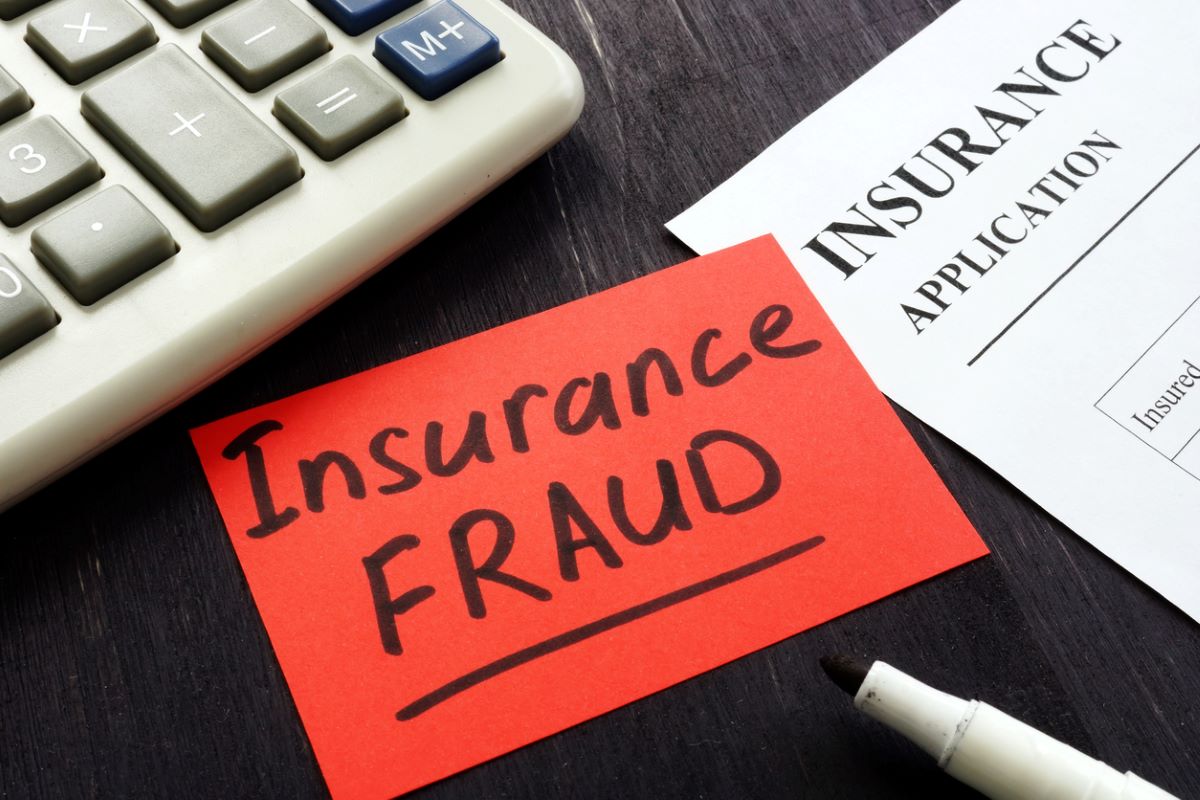

Finance
What Happens If You Commit Insurance Fraud?
Published: November 12, 2023
Find out the consequences of committing insurance fraud and how it can impact your finance. Understand the legal implications and penalties involved.
(Many of the links in this article redirect to a specific reviewed product. Your purchase of these products through affiliate links helps to generate commission for LiveWell, at no extra cost. Learn more)
Table of Contents
Introduction
In today’s world, insurance plays a vital role in protecting individuals, businesses, and assets from unexpected financial losses. However, there are unfortunate instances where individuals may be tempted to commit insurance fraud for personal gain. Insurance fraud is a serious offense that not only carries legal consequences but also has far-reaching implications for the overall insurance industry.
Insurance fraud can take various forms, from exaggerating claims to deliberately causing damage or fabricating accidents. Whether it’s a desperate attempt to receive a payout or an opportunistic scheme to exploit the system, the consequences of committing insurance fraud can be severe.
In this article, we will explore the different types of insurance fraud, its legal penalties, and the impacts it can have on one’s insurance coverage, premiums, and overall reputation. Additionally, we will delve into the measures taken by insurance providers to prevent fraud and protect their customers.
It is crucial to understand that insurance fraud is not only ethically wrong but also has extensive consequences that can disrupt the stability of the insurance industry, ultimately affecting honest policyholders. Therefore, it is essential for individuals and businesses alike to have a clear understanding of the implications associated with committing insurance fraud.
Let’s dive deeper into the world of insurance fraud and understand what happens when someone crosses the line and engages in fraudulent activities.
Definition of Insurance Fraud
Insurance fraud can be defined as the deliberate act of deceiving an insurance company or policy provider for personal gain. It involves making false statements, providing misleading information, or engaging in fraudulent activities with the intent to obtain insurance benefits that would not be otherwise granted.
Insurance fraud can be perpetrated by policyholders, third-party claimants, or even insurance professionals themselves. It can occur in various forms, such as staging accidents, inflating claims, deliberate damage, or misrepresentation of facts. The main objective behind insurance fraud is to receive financial compensation or benefits that are not legitimately entitled.
There are two main types of insurance fraud:
- Hard Fraud: Hard fraud refers to the deliberate fabrication of a claim or event that never actually occurred. Examples include intentionally causing a car accident or setting a property on fire to collect insurance money.
- Soft Fraud: Soft fraud, also known as opportunistic fraud, involves exaggerating legitimate claims or providing false information to inflate the value of a claim. This can include exaggerating the extent of injuries sustained in a minor accident or failing to disclose pre-existing conditions to obtain health insurance coverage.
Insurance fraud is not limited to a specific type of insurance but can occur across various areas, including auto insurance, health insurance, property insurance, and even life insurance. Regardless of the type, insurance fraud undermines the integrity of the insurance system and ultimately leads to increased costs for honest policyholders.
It is important to note that insurance fraud is a criminal offense and is punishable by law. The severity of the penalties varies depending on the jurisdiction and the nature of the fraudulent activity.
Types of Insurance Fraud
Insurance fraud can manifest in various forms and across different types of insurance. Here are some common types of insurance fraud:
- Staged Accidents: This type of fraud involves intentionally causing or orchestrating an accident in order to file false insurance claims. It can range from staging a car collision to creating slip and fall incidents.
- Inflated Claims: Inflated claims occur when a policyholder or claimant exaggerates the extent of damages or injuries in order to receive a larger payout from the insurance company. This could involve overestimating repair costs or inflating medical expenses.
- Property Arson: Property owners may intentionally set fire to their own property to collect insurance proceeds. This type of fraud can be particularly dangerous and can result in loss of life or severe property damage.
- Identity Theft: Insurance policies can be fraudulently obtained using someone else’s identity. This can include using stolen personal information to apply for policies or making false claims under someone else’s name.
- Healthcare Fraud: Healthcare insurance fraud involves submitting false medical claims, overbilling for services, or providing unnecessary treatments to receive higher reimbursements from insurers.
- Workers’ Compensation Fraud: Employees may fake injuries or exaggerate the severity of their injuries to fraudulently claim workers’ compensation benefits. This can range from falsely reporting workplace accidents to working and earning income while receiving benefits.
- Life Insurance Fraud: Life insurance fraud can take the form of concealing important information during the application process, such as pre-existing conditions or risky behaviors, in order to secure coverage at lower premiums. It may also involve individuals faking their own death or providing false death certificates to collect life insurance benefits.
These are just a few examples of the types of insurance fraud that exist. It is essential for insurance companies to remain vigilant and implement effective fraud detection mechanisms to protect their resources and policyholders from fraudulent activities.
Consequences of Committing Insurance Fraud
The repercussions of committing insurance fraud can be severe and far-reaching, impacting both individuals and the overall insurance industry. Here are some of the consequences associated with insurance fraud:
- Legal Penalties: Insurance fraud is considered a criminal offense and is punishable by law. Depending on the jurisdiction and the nature of the fraud, individuals found guilty of insurance fraud can face hefty fines, probation, community service, and even imprisonment.
- Loss of Insurance Coverage: Engaging in insurance fraud can lead to the cancellation or denial of insurance coverage. Insurance companies have the right to void policies if fraudulent activities are discovered. This can leave individuals without the protection they need and make it difficult for them to secure coverage in the future.
- Financial Consequences: If found guilty of insurance fraud, individuals may be required to pay back any benefits or compensation received fraudulently. This can result in significant financial burdens, including repaying large sums of money to insurance companies.
- Criminal Record: Being convicted of insurance fraud can result in a permanent criminal record. This can have detrimental effects on employment prospects, reputation, and personal life. It may also lead to difficulties in obtaining loans or other financial assistance.
- Increased Insurance Premiums: Insurance fraud affects not only the fraudster but also honest policyholders. Insurance companies often pass on the costs of fraudulent activities to their customers by increasing premiums. This means that innocent individuals may experience higher insurance costs due to the actions of a few dishonest individuals.
- Loss of Trust and Reputation: Engaging in insurance fraud can tarnish an individual’s reputation and lead to a loss of trust from friends, family, and colleagues. It can also damage professional relationships with insurance providers, making it difficult to secure insurance coverage in the future.
- Increased Scrutiny: Insurance companies are increasingly implementing advanced fraud detection technology and conducting thorough investigations to identify and prevent fraudulent activities. Individuals suspected of insurance fraud may be subjected to surveillance, background checks, and intense scrutiny. This invasion of privacy can be a significant consequence of committing insurance fraud.
It is crucial to remember that the consequences of insurance fraud extend beyond the immediate penalties. Committing fraud not only impacts individuals personally but also undermines the stability and affordability of insurance for everyone. It is always better to act with integrity and honesty to protect oneself and maintain the integrity of the insurance industry.
Legal Penalties for Insurance Fraud
Insurance fraud is a serious offense and is punishable by law in most jurisdictions. The legal penalties for insurance fraud vary depending on the jurisdiction and the severity of the fraudulent activity. Here are some of the common legal consequences individuals may face for committing insurance fraud:
- Fines: Individuals found guilty of insurance fraud may be subject to hefty fines. The amount of the fine can vary depending on the nature and value of the fraudulent claim or activity. Fines can range from a few thousand dollars to significant sums.
- Probation: In some cases, individuals may be sentenced to probation instead of or in addition to fines. During probation, individuals are required to comply with certain conditions set by the court, such as regular check-ins, community service, or mandatory counseling.
- Restitution: Restitution refers to the requirement of repaying the insurance company or policyholder the amount of money that was fraudulently obtained. Courts may order individuals to repay the insurance company for the fraudulent benefits received, which can result in substantial financial obligations.
- Imprisonment: Depending on the severity of the insurance fraud and applicable laws, individuals convicted of insurance fraud may face imprisonment. The length of the prison sentence can range from several months to several years, especially in cases involving substantial financial losses or multiple instances of fraud.
- Criminal Record: Being convicted of insurance fraud can result in the creation of a permanent criminal record. This can have long-term consequences, including difficulties in finding employment, obtaining loans, or passing background checks.
- Professional Consequences: Professionals working in the insurance industry, such as agents or adjusters, who engage in fraudulent activities can face severe professional consequences. This can include revocation of licenses, loss of employment, and damage to their professional reputation.
It is important to note that the legal penalties for insurance fraud are meant to serve as a deterrent and to protect the overall integrity of the insurance system. By imposing significant consequences for fraudulent activities, the legal system aims to discourage individuals from engaging in fraudulent behavior and ensure fair treatment for honest policyholders.
To avoid legal penalties, individuals must understand the potential consequences of insurance fraud and act with integrity when dealing with insurance claims or policies. It is always best to be honest and transparent with insurance providers to maintain trust and uphold the principles of insurance coverage.
Impact on Insurance Coverage
Committing insurance fraud can have significant implications on an individual’s insurance coverage. Insurance companies have the right to take action if fraud is discovered, which can result in the denial or cancellation of coverage for the policyholder involved. Here are some of the key impacts that insurance fraud can have on insurance coverage:
- Cancellation of Coverage: If an insurance company determines that a policyholder has engaged in fraudulent activities, they have the right to cancel the insurance policy. This means that the policyholder will no longer have the protection provided by the insurance policy and will need to seek coverage elsewhere, which can be challenging after being labeled as fraudulent.
- Denial of Claims: Insurance fraud can lead to the denial of any claims that are associated with the fraudulent activity. This can result in significant financial losses for the policyholder, as they will not receive the compensation or benefits they were seeking. It is important to note that other legitimate claims might also be denied due to the loss of trust resulting from fraudulent behavior.
- Difficulty in Securing Coverage: Once a policyholder has been involved in insurance fraud, it becomes extremely difficult to secure coverage with other insurance providers. Insurance companies share information about fraudulent activities among themselves, and being marked as a fraudster can result in being blacklisted by the industry. This can leave individuals without any means of obtaining the insurance coverage they need.
- Higher Premiums: Even if insurance coverage is not canceled or denied, committing insurance fraud can lead to higher insurance premiums. Insurance companies factor in the risk of fraud when calculating premiums for their policies. When fraud is detected, it increases the overall risk for the insurer, which is often reflected in higher premiums for all policyholders.
- Exclusion of Coverage: In some cases, insurance companies may exclude coverage for specific incidents or risks associated with the fraudulent activity. For example, if an individual staged a car accident, the insurance company may exclude coverage for any future claims related to car accidents or injuries caused by that individual.
Insurance fraud not only affects the individual involved but also has wider implications for honest policyholders and the insurance industry as a whole. To protect their coverage and ensure fair treatment, policyholders must act with honesty, transparency, and integrity when dealing with insurance claims and policies.
Effects on Insurance Premiums
Committing insurance fraud can have a direct impact on insurance premiums for both individuals involved in the fraud and other policyholders. Insurance companies use various factors to calculate premiums, and fraudulent activities can significantly influence these calculations. Here are some of the effects that insurance fraud can have on insurance premiums:
- Increased Premiums for Fraudsters: Individuals who have been involved in insurance fraud are likely to face higher insurance premiums. Insurance companies view fraudsters as high-risk individuals, and as a result, they may charge higher premiums to compensate for the increased likelihood of fraudulent activities.
- Premium Increases for Honest Policyholders: Insurance fraud affects not only the individuals committing the fraud but also honest policyholders. When insurance companies incur losses due to fraudulent activities, they pass on these costs to their customers by increasing premiums. This means that innocent policyholders end up paying higher premiums to offset the financial impact of fraud.
- Reduced Availability of Affordable Coverage: Insurance companies may become more cautious and restrict coverage options in regions or industries with high instances of fraud. This limited availability of coverage can lead to higher premiums due to the reduced competition among insurance providers.
- Inflation of Claim Costs: Insurance fraud leads to an increase in overall claim costs for insurance companies. As a result, insurers may adjust their premium rates to cover these higher costs, impacting premiums for all policyholders. This inflation of claim costs can make insurance more expensive for everyone, even those not directly involved in fraudulent activities.
- Loss of Discounts or Policy Features: Individuals involved in insurance fraud may lose access to certain discounts or policy features that are typically offered to honest policyholders. Insurance companies may remove or restrict these benefits as a consequence of fraudulent activities, further increasing the costs for fraudsters.
It is important to understand that insurance premiums are influenced by various factors, including the risk profile of the insured individual or property. Insurance fraud contributes to an increased perception of risk, leading to higher premiums for both fraudulent individuals and the wider customer base. To maintain affordable insurance coverage, it is essential for individuals to act with honesty and integrity, report any suspicious activities, and support efforts to combat insurance fraud.
Damage to Reputation
Committing insurance fraud can have a significant and long-lasting impact on an individual’s reputation. The act of engaging in fraudulent activities erodes trust, not only with insurance providers but also with friends, family, colleagues, and the wider community. Here are some key factors that contribute to the damage of one’s reputation when involved in insurance fraud:
- Loss of Trust: Engaging in insurance fraud breaks the trust between the individual and their insurance provider. Insurance companies rely on the honesty and integrity of their policyholders to provide accurate information and genuine claims. When fraud is discovered, it creates a breach of trust that is difficult to repair.
- Social Stigma: Insurance fraud is viewed as a serious offense and is socially stigmatized. Being associated with fraudulent activities can lead to negative perceptions and judgments from others. This can result in strained relationships, isolation, and the loss of social standing within the community.
- Damage to Personal and Professional Relationships: Committing insurance fraud not only damages personal relationships but can also have severe consequences for professional relationships. Employers, colleagues, and business partners may view individuals involved in fraud as untrustworthy and unreliable. This can lead to job loss, difficulty in finding new employment opportunities, and potential legal consequences within the professional sphere.
- Negative Impact on Future Insurance Coverage: Insurance fraud can have long-lasting effects on an individual’s ability to secure insurance coverage in the future. Once labeled as a fraudster, it becomes challenging to find insurance providers willing to extend coverage. This can create significant difficulties when trying to protect assets or obtain essential coverage for health, auto, or property.
- Reputation in the Industry: Individuals working in industries closely related to insurance, such as finance or risk management, may suffer severe damage to their professional reputation. Being associated with fraudulent activities can lead to the loss of professional licenses, disqualification from industry certifications, and limited career prospects.
Rebuilding a damaged reputation after involvement in insurance fraud can be a challenging and lengthy process. It requires significant efforts to demonstrate remorse, rectify past actions, and regain the trust of both individuals and institutions. It is always best to act with honesty and integrity when dealing with insurance matters to protect one’s reputation and maintain trust within personal and professional relationships.
Investigation and Surveillance
Insurance companies take insurance fraud seriously and employ various methods, including investigation and surveillance, to detect fraudulent activities. When fraud is suspected, insurers conduct thorough investigations to gather evidence and verify the authenticity of claims. Here are some key aspects of investigation and surveillance related to insurance fraud:
- Data Analysis: Insurance companies employ advanced data analysis techniques to identify patterns and anomalies in claims data. Through data mining, they can pinpoint characteristics and behaviors that are indicative of fraudulent activities. This helps insurers in focusing their investigation efforts on potentially fraudulent claims.
- Claim Documentation Review: Insurers carefully examine claim documentation to detect any inconsistencies or indications of fraud. They assess the accuracy of the information provided, review medical records and police reports, and cross-reference details to ensure they align with the claimed incident.
- Surveillance: Insurance companies may hire private investigators to conduct surveillance on individuals suspected of fraudulent activities. This can involve monitoring their daily activities, capturing video evidence, and documenting any suspicious behaviors that contradict the claimed injuries or damages.
- Background Checks: Insurers often perform background checks on claimants to verify their identity, employment history, and personal background. This helps to uncover any discrepancies or fraudulent behavior that may impact the validity of the claim.
- Cooperation with Law Enforcement: In cases where insurance fraud is suspected, insurers may work closely with law enforcement agencies to share information, provide evidence, and collaborate on investigations. This partnership allows for a more comprehensive and effective approach to combating insurance fraud.
- Use of Technology: Insurance companies employ advanced technology and software to aid in fraud detection. This can include predictive modeling, artificial intelligence, and machine learning algorithms to analyze data, detect patterns, and identify potential fraud indicators.
It is worth noting that the investigation and surveillance conducted by insurance companies are carried out in accordance with legal and ethical guidelines. They are focused on uncovering fraudulent activities and protecting the interests of honest policyholders.
Individuals should be aware that their actions can be subject to scrutiny and investigation by insurance companies when filing claims. It is essential to provide accurate and truthful information to prevent any suspicion of fraud and ensure a smooth claims process.
Insurance Fraud Prevention Measures
To combat the detrimental effects of insurance fraud, insurance companies have implemented various prevention measures to detect and deter fraudulent activities. Here are some key strategies and initiatives employed to prevent insurance fraud:
- Educating Policyholders: Insurance companies provide educational resources to policyholders to raise awareness about the consequences of insurance fraud. This includes information on how to avoid becoming a victim of fraud and steps to take when filing a claim.
- Strict Underwriting: Insurance companies conduct thorough underwriting processes to assess the risk profile of potential policyholders. This includes verifying information provided in the application, conducting background checks, and using sophisticated risk assessment tools to identify any potential red flags.
- Investing in Fraud Detection Technology: Insurers employ advanced technology, such as predictive modeling and analytics, to identify suspicious patterns and anomalies in claims data. These technologies help prioritize investigations and flag potentially fraudulent activities.
- Collaboration and Information Sharing: Insurance companies work together and collaborate with industry associations, law enforcement agencies, and regulatory bodies to share information and best practices in combating insurance fraud. This cooperation allows for the identification of emerging trends and the development of effective prevention strategies.
- Robust Claim Investigation: Insurance companies conduct thorough investigations into suspicious claims to verify their authenticity. This may involve reviewing documentation, conducting interviews, and utilizing surveillance techniques to gather evidence and detect any signs of fraud.
- Encouraging Whistleblowing: Insurance companies encourage policyholders and employees to report any suspicious activities or fraudulent behavior through designated hotlines or online reporting systems. Whistleblower programs help uncover fraudulent activities and deter individuals from engaging in fraudulent behavior.
- Training Employees: Insurance companies provide comprehensive training to employees, especially claims handlers and underwriters, to help them identify potential indicators of fraud. This includes educating employees about different types of fraud, red flags to watch for, and protocols for reporting suspected fraudulent activities.
- Effective Fraud Analytics: Insurers utilize advanced fraud analytics tools to identify historical patterns and analyze complex relationships within claims data. These tools help detect hidden connections, identify fraud networks, and uncover fraudulent activities that may otherwise go unnoticed.
- Collaborative Investigations: Insurance companies collaborate with law enforcement agencies to conduct joint investigations into suspected cases of insurance fraud. This partnership strengthens the legal response to fraud and enhances the chances of successful prosecution.
By implementing these preventive measures, insurance companies strive to protect honest policyholders, maintain the viability of the insurance industry, and ensure fair and affordable coverage for everyone. It is essential for individuals to support these initiatives and act with honesty and integrity when engaging with insurance providers to contribute to the prevention of insurance fraud.
Conclusion
Insurance fraud is a serious offense that carries significant consequences for those involved. Whether it is staging accidents, submitting false claims, or providing misleading information, insurance fraud undermines the integrity of the insurance industry and leads to increased costs for honest policyholders.
Throughout this article, we have explored the different aspects of insurance fraud, including its definition, types, legal penalties, and the impacts it has on insurance coverage, premiums, and reputation. It is clear that insurance fraud has far-reaching ramifications and can have long-lasting effects on individuals, both personally and professionally.
However, insurance companies are actively implementing preventive measures, such as education, advanced technology, collaborative investigations, and employee training, to detect and deter fraudulent activities. These efforts are crucial in maintaining the integrity of the insurance industry, ensuring fair treatment for honest policyholders, and mitigating the financial consequences of fraud.
As consumers, it is important to act with honesty and transparency when dealing with insurance matters. By providing accurate information, reporting any suspicious activities, and supporting the prevention initiatives of insurance companies, we contribute to a stronger and more trustworthy insurance system.
Ultimately, combating insurance fraud requires a collective effort from insurance providers, policyholders, law enforcement agencies, and regulatory bodies. By working together to expose and prevent fraudulent activities, we can help protect the interests of honest policyholders, maintain the affordability of insurance coverage, and uphold the principles of integrity and trust within the insurance industry.














